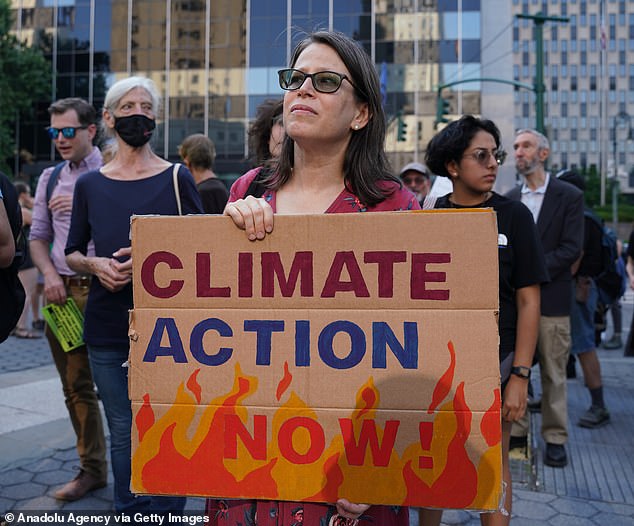Nearly half of Americans believe climate change will destroy the Earth in their lifetime, survey finds – these are the states where the most ominous people live
Scientists have predicted that climate change will warm our planet in the coming decades, but many Americans believe this shift will mean the end of the world.
A new survey of 5,000 people found that 48 percent of people believe they will see climate change destroy the Earth.
Hawaiians were the most concerned, with 61 percent saying it will be worse for their state than others, followed by Vermonters (59 percent) and New Mexicans (56 percent).
While Americans are sounding the alarm, 37 percent of respondents say they only take environmental action because it makes them feel like a good person — not just to help the planet.
A new survey of 5,000 Americans found that 48 percent of people believe they will see climate change destroy the Earth
The survey, conducted by Talker Research, was a random opt-in survey evenly distributed to 100 people per state, who were asked whether they believe climate change will have a greater impact on their state than on other states.
About 54 percent in Minnesota agreed that the climate crisis will devastate the Earth in their lifetime, followed by Connecticut (53 percent), Louisiana (53 percent), Maine (53 percent), Rhode Island (53 percent and Colorado (52 percent). ).
Indiana ranks 50th, with only 36 percent of Americans believing the end is near, as reported by SWNS.
As Americans fear that a warming world will mean the end of life as we know it, many reported taking action only for selfish reasons.
When respondents were asked whether the intent of their actions or the end result was more important, 33 percent said the result was; 50 percent said both were equally important.
And regardless of why they take environmentally conscious actions, 32 percent say it helps them sleep better at night.

While Americans are sounding the alarm, 37 percent of respondents say they only take environmental action because it makes them feel like a good person – and not just to help the planet.
About 10 percent of Americans have spent so much time worrying about their world that they feel like they don’t have time to take care of themselves.
These individuals may be wasting their energy, according to a Cambridge professor who argued that the world will not end due to climate change.
Professor Mike Hulme told DailyMail.com that belief in the urgent fight against climate change has gone far beyond the realm of science and has become an ideology.
He called this ideology “climatism,” and he argues that it can distort the way society approaches the world’s ills by placing too much emphasis on slowing global warming.
The problem, he said, is that this narrow focus distracts from other important moral, ethical and political goals, such as helping people in the developing world rise out of poverty.
Then there was Hannah Ritchie, a data scientist at the University of Oxford, who had also believed that people would die from the climate crisis, but recently made an about-face.
Ritchie claimed that doomsday warnings of floods, widespread famine and deaths from disasters overshadow the progress quietly made in recent years, she wrote for The times.
“To get this out of the way, I want to make one thing absolutely clear: I am not a climate change denier or minimizer,” reads an excerpt from Ritchie’s book.
‘I have spent my entire life – inside and outside of work – researching, writing and trying to understand our environmental problems and how we can solve them.’
She went on to explain that there may be less harm in considering that the overall disaster is exaggerated, because “the exaggeration simply acts as a counterpoint to those who downplay the issue.”
“But I am convinced there is a better, more optimistic and fairer way forward.” the book continued.
She pointed out how emissions per person peaked in 2012 and have remained the same since, along with the idea that organic food is not more climate-friendly and that the feared 2.7 degrees Celsius warming is not a tipping point into oblivion.
“It has become common to tell children that they will die from climate change,” reads the first line of the introduction.
